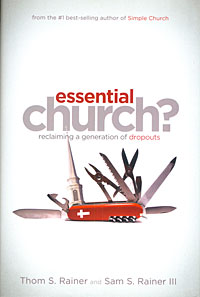Karen grew up in church. In college, she became active in student ministry and, after graduating, joined a comfortable church.

Seven months later, she dropped out.
Church somehow lost its importance in Karen’s life. Living in southern Florida, she decided there were plenty of other things to do on Sundays.
“I really don’t feel that guilty,” she said. “I still pray and read my Bible.”
Karen is just one of many young adults who, between the ages of 18-22, stop going to church for a year or more, according to LifeWay Research data.
In a new book – “Essential Church? Reclaiming a Generation of Dropouts” – Thom Rainer and his son Sam examine why people such as Karen have left churches. They also offer solutions for churches in reaching out to this growing number of dropouts.
The elder Rainer, president of LifeWay Christian Resources and author of “Simple Church” among his 20 titles, has served as pastor or interim pastor of 11 churches. Sam is a pastor in Sarasota, Fla., who, as president of Rainer Research, speaks frequently on helping churches become stronger and healthier.
The Rainers found in their research that plenty of people are members of churches but either rarely attend or don’t go at all. Specifically, there are 16 million people who are members of churches affiliated with the Southern Baptist Convention, but on any given Sunday, only 6 to 7 million of them show up. There are 5 or 6 million whose attendance pattern is CEO (Christmas, Easter and Other special events) or they never show up, the Rainers contend in the book.
“We saw this research and this book as a tool to remedy that problem,” Thom Rainer said.
While researching the book, the Rainers interviewed some of those who have dropped out of church. They also share what they’ve learned through their own experiences as pastors.
“We used the first half of the book to discuss the ‘why’ behind that reality,” Thom Rainer said. “But we were not satisfied to produce a book on the descriptive problem alone. So, in the second half of the book, we offer church leaders prescriptive solutions.”
The book points to many reasons why people drop out of church. Some of them simply want a break. Others move off to college and stop attending. Many start working on Sundays and can no longer attend church.
The problem is that once they stop going, they may not find a reason to go back.
The Rainers believe all of these reasons come down to one thing – most of these people no longer see church as an essential part of their lives. It’s that discovery that fueled the Rainers’ desire to write their book on reclaiming a generation of church dropouts.
“We believe that it is possible, but not necessarily easy, for every church to become essential to the lives of their members,” Thom Rainer said.
Churches first have to be willing to try new approaches if they are going appeal to those who have lost interest – especially younger generations. Pastors and church leaders need to give people a reason to keep coming back, the Rainers write.
Younger generations hunger for more in-depth biblical training, not “anemic teaching and preaching,” Thom Rainer added.
One church dropout, identified as as “Marcus” in the book, is quoted as saying, “I would hear about passages from three or four books of the Bible in a single sermon, but I couldn’t figure out how they tied together. And then I would go to a small group, and we would talk about some great issues, but no one explained how it tied in to the totality of scripture. After four years at that church, I had not received any significant doctrinal teachings.”
Another solution involves giving younger members more responsibility and opportunities of leadership, thus giving them more reason to engage in the church, the Rainers write, noting that gimmicks and sales pitches don’t work.